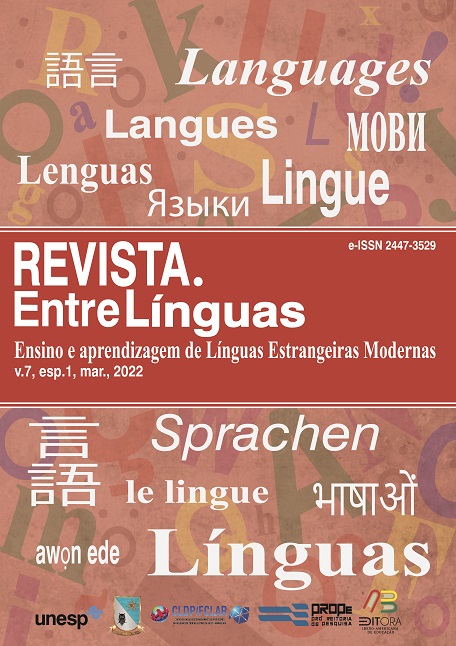Estado de educación en lengua extranjera y música en un sistema universitario no lingüístico
DOI:
https://doi.org/10.29051/el.v8iesp.1.16917Palabras clave:
Lengua Extranjera, Materias Principales y Complementarias, Voz Principal, AcompañamientoResumen
Este documento tiene como objetivo proporcionar una base teórica del estatus de "lengua extranjera" como disciplina académica en el rango de otras materias estudiadas en una universidad no lingüística. Las investigaciones muestran que se imponen altas exigencias a las materias complementarias, como el acompañamiento y la lengua extranjera, que tienen su estatus individual así como rasgos característicos semánticos y dinámicos. La interacción beneficiosa del solista y el acompañante juega un papel mutuamente enriquecedor al dar una idea de la pieza musical tanto para el músico como para la audiencia. El componente humanitario introducido en el proceso educativo a través de los estudios de idiomas complementa y enriquece todo el proceso y lo dota de plenitud semántica. El análisis de los paralelos dialécticos (sujeto principal-sujeto suplementario, voz principal-acompañamiento) demostró que cada uno de sus componentes tiene su propio estatuto.
Descargas
Citas
ABRUDAN, C. S.; STURZA, A.; SUPURAN, A. Raising Engineering Students’ Awareness as Regards the Importance of Improving their Proficiency in English. Journal of Teaching English for Specific and Academic Purposes, v. 9, n. 1, p. 99-108, 2021. Available in: http://espeap.junis.ni.ac.rs/index.php/espeap/article/view/1095. Access in: 05 Oct. 2020.
BAZHANOV, N. S. Agogic and tempo in sounding of the musical piece. Bulletin of Tomsk State University Journal of Cultural Studies and Art History, v. 36, p. 130–139, 2019. Available in: https://cyberleninka.ru/article/n/agogika-i-temp-v-zvuchanii-muzykalnogo-proizvedeniya. Access in: 12 Mar. 2021.
GANYUSHKINA, E. V.; MUKHINA, T. G. Literature as a means of professional and ethical culture development with medical students. In: PROCEEDINGS OF INTERNATIONAL APPLIED RESEARCH CONFERENCE, 4., 2021, Nizhny Novgorod. Annals[…]. Lobachevsky State University of Nizhny Novgorod, Nizhny Novgorod, Russia, 2021.
GLINKA, M. I. Literary Heritage. Leningrad, 1952.
HANNA, M.; FINS, J. J. Power and communication: Why simulation training ought to be complemented by experiential and humanist learning. Acad. Med., v. 81, n. 3, p. 265–270, 2006. Available in: https://pubmed.ncbi.nlm.nih.gov/16501273/. Access in: 12 Feb. 2021.
HARMER, J. The Practice of English Language Teaching. London: Longman, 1991.
IVANOV, S. S. Forming listening and verbal and motor functions of the speaker in a foreign language environment. In: PROCEEDINGS OF INTERNATIONAL APPLIED RESEARCH CONFERENCE, 2018, Nizhny Novgorod. Annals […]. Lobachevsky State University of, Nizhny Novgorod, 2018.
KANNO, Y.; STUART, C. Learning to Become a Second Language Teacher: Identities-in-Practice. The Modern Language Journal, v. 95, n. 2, p. 236-252, 2011. Available in: https://onlinelibrary.wiley.com/doi/10.1111/j.1540-4781.2011.01178.x. Access in: 12 Apr. 2021.
KHUSNULINA, R. R.; ISLAMOVA, G. G. Enriching role of a foreign language in a non-linguistic university. Teaching And Research Activities, p. 276-281, 2011. Available in: https://m.cyberleninka.ru/article/n/razvivayuschaya-rol-inostrannogo-yazyka-v-neyazykovom-vuze. Access in: 04 Mar. 2021.
KRYLOV, I. A. Quartet. St. Petersburg, 1811.
KUZNETSOVA, T. G. Foreign language role in preparing future specialists in a non-linguistic university. Saratov: Saratov National Research State University. Available in: https://www.sgu.ru/sites/default/files/textdocsfiles/2014/03/13/kuznecova_t.g.pdf. Access in: 10 Mar. 2021.
LONGMAN DICTIONARY OF CONTEMPORARY ENGLISH. London: Pearson Education limited. 2001.
LUBLINSKIY, A. A. Theory and practice of accompaniment. Leningrad: Muzyka, 1972.
MAZUR, A. E. The Art of Appreciating Accompaniment. Musical U, EUA. Available in: https://www.musical-u.com/learn/the-art-of-appreciating-accompaniment/. Access in: 12 June 2021.
PENNINGTON, M. C. Teacher Identity in TESOL: A Frames Perspective. In: CHEUNG, Y. L.; SAID, S. B.; PARK, K. (eds.). Advances and Current Trends in Language Teacher Identity Research. Abingdon: Routledge, 2015.
RAJGURU, S. P. Establishing English for specific purposes position in ELT Context. Journal of Teaching English for Specific and Academic Purposes, v. 5, n. 3, p. 515-519, 2017. https://doi.org/10.22190/JTESAP1703515R
REBENKO, M. Modelling ESP Teacher Identity in Ukranian Tertiary Education. Journal of Teaching English for Specific and Academic Purposes, v. 8, n. 3, p. 201-213, 2020. Available in: http://espeap.junis.ni.ac.rs/index.php/espeap/article/view/1061. Access in: 20 Mar. 2021.
RIMAN, G. Musical Dictionary. Moscow: Yurgenson, 1901.
SUPRUNOV, S. E. Studying foreign languages in a non-linguistic university. Samara: Vector, 2017.
SVIDERSKY, V. I. Structures and Elements Dialectics. Moscow, 1962.
TAO, J. T., GAO, X. A. Identity Constructions of ESP Teachers in a Chinese University. English for Specific Purposes, v. 49, p. 1-13, 2018. Available in: https://www.sciencedirect.com/science/article/abs/pii/S0889490617302685. Access in: 2 June 2021.
TER-MINASOVA, S. G. Language and intercultural competence. Мoscow: Slovo, 2000.
VETLUZHSKAYA, M. V. et al. Characteristics of Emotional Intelligence and Empathic Abilities in Medical Students. Integration of Education, v. 23, n. 3, p. 404-422, 2019. Available in: https://www.researchgate.net/publication/336142771_Characteristics_of_Emotional_Intelligence_and_Empathic_Abilities_in_Medical_Students. Access in: 14 Apr. 2021.
VOVSI-TILL'E, L. A. Modern goals of teaching foreign languages in a non-linguistic university. Pedagogical Journal, v. 8, n. 3A, p. 132-137, 2018. Available in: http://publishing-vak.ru/file/archive-pedagogy-2018-3/18-vovsi-tille.pdf. Access in: 13 June 2021.
WU, H.; BADGER, R. G. In a Strange and Uncharted Land: ESP teachers’ strategies for dealing with unpredicted problems in subject knowledge during class. English for Specific Purposes, v. 28, n. 1, p. 19-32, 2009. Available in: https://www.sciencedirect.com/science/article/abs/pii/S0889490608000483. Access in: 15 June 2021.
YAZAN, B.; LINDAHL, K. Language Teacher Identity in TESOL: Teacher Education and Practice as Identity Work. New York: Routledge, 2020.
Publicado
Cómo citar
Número
Sección
Licencia

Esta obra está bajo una licencia internacional Creative Commons Atribución-NoComercial-CompartirIgual 4.0.
Os manuscritos aceitos e publicados são de propriedade da Revista EntreLínguas. Os artigos publicados e as referências citadas na Revista EntreLínguas são de inteira responsabilidade de seus autores.
Transferência de direitos autorais – autorização para publicação
Caso o artigo submetido seja aprovado para publicação, já fica acordado que o(s) autor(es) autoriza(m) a UNESP a reproduzi-lo e publicá-lo na EntreLínguas, entendendo-se os termos “reprodução” e “publicação” conforme definição respectivamente dos incisos VI e I do artigo 5° da Lei 9610/98. O artigo poderá ser acessado pela rede mundial de computadores (Internet), sendo permitidas, a título gratuito, a consulta e a reprodução de exemplar do artigo para uso próprio de quem a consulta, desde que haja a citação ao texto consultado. Essa autorização de publicação 328 EntreLínguas, Araraquara, v. 1, n .2, p. 323-328, jul./dez. 2015 não tem limitação de tempo, ficando a UNESP responsável pela manutenção da identificação do(s) autor(es) do artigo. Os artigos publicados e as referências citadas na Revista EntreLínguas são de inteira responsabilidade de seus autores.











